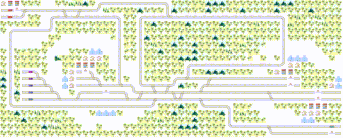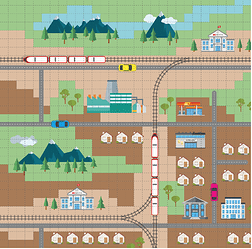Deadline Extended to 4th November and Prizes Doubled!
A real-world problem like Flatland inspires niche and novel approaches to find better solutions, and this competition is constantly pushing everyone to get creative and learn from each other’s performances.
To increase collaboration and novel problem-solving, AIcrowd is excited to announce the Flatland Community Prize:
Create any form of work that contributes towards a better understanding of the Flatland environment by November 4th to win up to 500 CHF!
 CONTRIBUTIONS
CONTRIBUTIONS
Your contribution can be in terms of:
- Notebooks (runnable online on Colab or Binder)
- Data visualizations
- Custom observation builders (see the doc)
- Articles
- Videos
- Anything else
There are no constraints on how you wish to present your ideas! You can take inspiration from some works created by previous participants:
-
 3D space-time cube visualization by Jeremy (press on “testScene” then wait)
3D space-time cube visualization by Jeremy (press on “testScene” then wait) -
 My journey of trying DRL to optimize train scheduling by Mels Hakobyan
My journey of trying DRL to optimize train scheduling by Mels Hakobyan -
 Leverage RL for building intelligent and adaptive trains that can successfully navigate a railway by
Leverage RL for building intelligent and adaptive trains that can successfully navigate a railway by
Netcetera
You can also check out these Master Thesis written in the context of the 2019 challenge:
-
 Existing and novel Approaches to the Vehicle Rescheduling Problem by Jonas Wälter
Existing and novel Approaches to the Vehicle Rescheduling Problem by Jonas Wälter -
 A study of DRL methods applied to the vehicle rescheduling problem in a railway environment by Giulia Cantini
A study of DRL methods applied to the vehicle rescheduling problem in a railway environment by Giulia Cantini
Of course we don’t expect this level of depth - although we don’t forbid it either 
 PRIZES
PRIZES
- 1st place: 500 CHF
- 2nd place: 300 CHF
- 3rd place: 200 CHF
 NEW DEADLINE
NEW DEADLINE
4th November 2020, 23:55 UTC
 TERMS
TERMS
- You must post your explainers on the challenge forum with the tag ‘explainer’, introducing and linking to your contribution.
- The prizes will be awarded as per the discretion of the organizers, and the popularity of the post in the community (based on number of likes
 ) - so share your post widely to spread the word!
) - so share your post widely to spread the word! - You can make multiple submissions, but you’re only eligible for the prize once.
- Your work needs to be published under a license and on a platform that allows other participants to use it. For example, code should be provided under an open-source license, and articles should be readable freely.
We’re looking forward to see what you come up with!
 Explanation of 2019 2nd place solution
Explanation of 2019 2nd place solution Contribution Ideas
Contribution Ideas
 Flatland advances state-of-the-art work in multi-agent reinforcement learning, and your contributions can play a key part in that advancement!
Flatland advances state-of-the-art work in multi-agent reinforcement learning, and your contributions can play a key part in that advancement!

